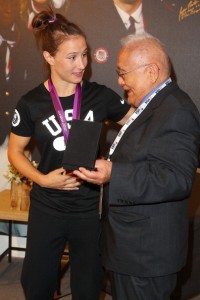Purdy: Oh what a comeback for San Jose judoka Marti Malloy
Posted by the San Jose Mercury News July 30, 2012.
By Mark Purdy
LONDON — Monday afternoon, Marti Malloy suffered the most crushing defeat of her judo life. But at least she had time to get over it and recover from her depression before facing her one last chance to win an Olympic medal.
Like, say, about 70 minutes or so. Just 70 minutes for the San Jose judoka to wipe out the notion that she’d blown a lifetime dream and try to reboot her confidence.
“That is a good question,” Malloy said when I asked how she did it.
I have seen remarkable comebacks in many sports. I am not sure if I’ve ever observed one better than Malloy’s comeback here in the 126-pound women’s judo tournament of the 2012 Games. It was a comeback that earned Malloy a bronze medal — just the second Olympic medal of any sort won by a USA female judo competitor, ever.
Not only that, but Malloy’s bronze victory unfolded before the 92-year-old eyes of legendary San Jose State judo coach Yosh Uchida, who made the trip to London to see his pupil perform.
“It was great to see,” said Uchida, dressed sharply in a dark gray suit and blue San Jose State tie. “We’re real proud of her. It was her real determination that did it.”
Determination? Or just outright guts? Maybe a little of both.
“It still gives me goose bumps right now thinking about it,” said Malloy, a 26-year-old native of Washington who won collegiate judo titles at San Jose State and lives in the South Bay.
Here’s how the drama unfolded:
The judo event at the Olympics is brutal. It’s like staging an entire NCAA basketball tournament in one day, except with shoulder throws and leverage. Competitors work their way through a bracket against opponent after opponent, with slight rest between. Malloy spent Monday morning defeating three opponents to reach the tournament semifinals.
And when she got there, things looked good. With a spot in the gold medal match on the line, Malloy was holding her own against Corina Caprioriu of Romania. But with just seven seconds left in regulation time, Malloy took an aggressive risk that backfired. Thud. She was caught off balance by Caprioriu, who put her down to seize the victory.
Flat on the mat, Malloy covered her eyes. She knew what the loss meant. The tournament format gave semifinal losers one last, desperate opportunity to claim one of two bronze medals awarded. In this case, that task would require Malloy to face and defeat the defending Olympic champion from Beijing 2008, Giulia Quintavalle of Italy, who is five inches taller than Malloy with four more years of experience.
And their crucial match would begin in about 70 minutes. She didn’t have long to wipe out negative thoughts and create positive ones.
“I had never fought her,” Malloy said of Quintavalle. “But I had been a big fan of hers. I sat down to recover and only 20 minutes later, I had to warm up again. It’s just the hardest thing, to try and put behind something like that and get ready for another one.”
There was consolation, of course, in the fact that Quintavalle had also suffered a stunning loss before facing Malloy. When they strode onto the mat with bronze on the line, both had to be exhausted. They were tentative for the first minute or so before Malloy went for broke. She saw an opening, faked one of her best moves and then unloaded another. In less than a second, Quintavalle was flat on her back. The referee pointed. Malloy had her medal.
“I was just elated,” Malloy said. “And when I looked up, I saw Yosh up in the seats, so happy. I think I started crying. He has been my No. 1 supporter.”
In more ways than one. Malloy had originally planned to just train in the South Bay and not attend college. Uchida insisted she enroll at SJSU and pursue a degree. She recently graduated with a B.S in advertising, with multiple stints on the dean’s list.
“She wouldn’t let any obstacles stand in her way,” Uchida said. “She didn’t have any money, had to get a job or two to get by. But she wasn’t going to be stopped. I felt bad for her today when she lost in that semifinal but thought she would have the determination to fight through it.”
I wondered if Uchida had taught Malloy her winning move.
“No, no,” he said. “She’s smarter than that.”
Malloy’s victory makes it a total of four Olympic medals for San Jose State judo competitors over the years, in a sport that has traditionally been dominated by Asian and European nations. The USA has never won a judo gold medal in either gender and has only won 11 medals, period. So you could say that SJSU accounts for more than a third of Olympic medals earned by America in the sport.
That’s not necessarily a shock. Uchida has guided San Jose State to 45 collegiate judo championships and still assists head coach Shintaro Nakano there. Uchida also once served as a USA Olympic coach and literally helped write the international judo rule book back in 1964, when he and several colleagues codified the standards and weight classes so that it could become an Olympic sport.
Yet as he watched Malloy receive her medal, Uchida was beaming as proudly as he has ever beamed. These could be the last Games he attends. Uchida sat alongside San Jose State team physician Dr. Robert Nishime. One of those part-time jobs held by Malloy to help subsidize her training has been a position as Nishime’s front desk receptionist.
“I think I lost an employee,” Nishime said after the medal ceremony.
Not necessarily. Just for fun, Malloy might want to report back for duty in Nishime’s office just so she can answer the phone this way: “Hello. This is an Olympic medal winner speaking. Want to hear about my kick-ass comeback?”
Contact Mark Purdy at mpurdy@mercurynews.com or 408-920-5092.

